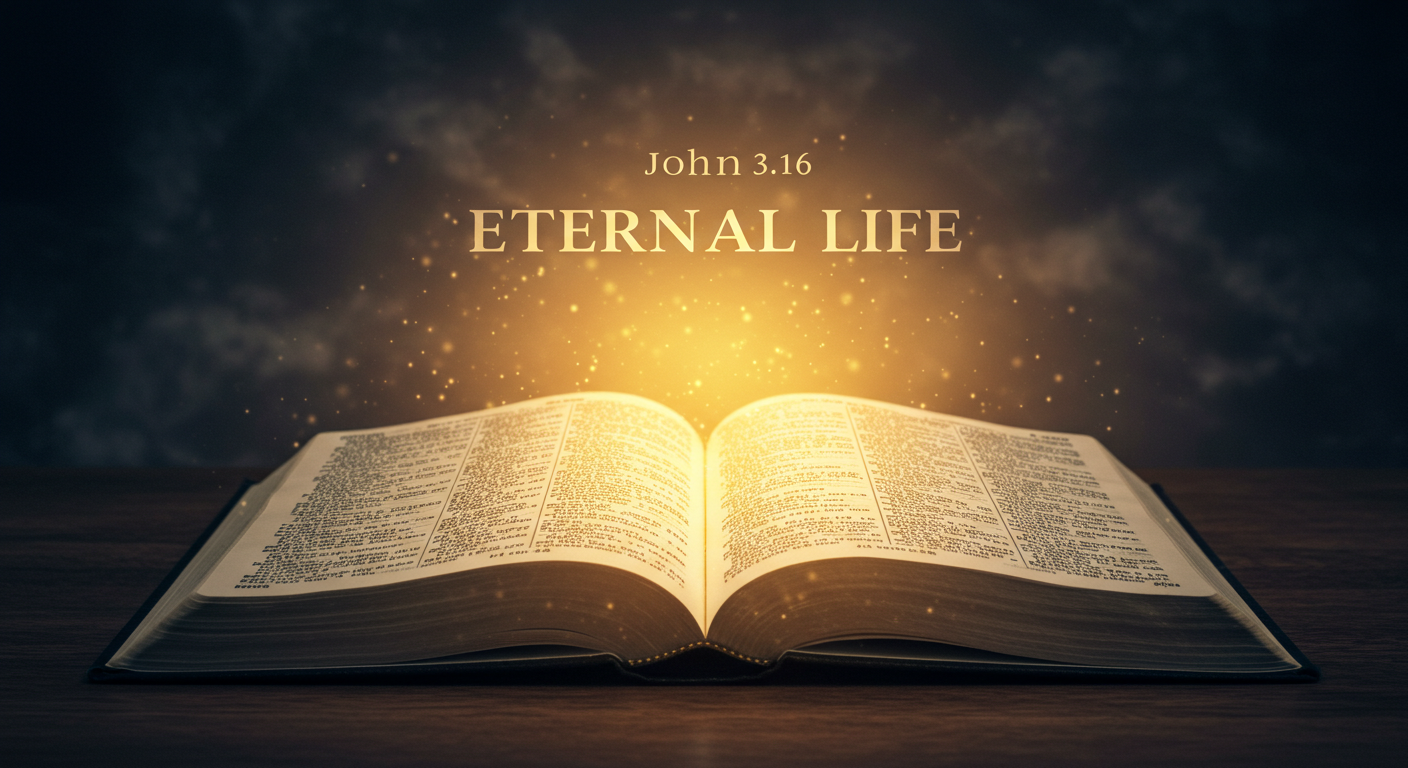What The Bible Teaches About Eternal Life
You’re asking an important question: what does the Bible teach about eternal life? This topic is central to Christian faith and affects how you live now and what you hope for later. The Bible reveals eternal life as both a present reality in Christ and a future hope of being with God forever. As you read, you’ll see how Scripture describes eternal life, how you receive it, what it changes in you today, and how it shapes your expectations for the future. Throughout this article, you’ll find direct Bible references linked to Bible Gateway so you can read the passages in context and explore further.
What does “eternal life” mean?
When the Bible speaks of “eternal life,” it’s not just length of time. It’s a life of a particular quality—a life that is defined by a relationship with God through Jesus. Jesus Himself gives a simple definition in His prayer to the Father: “Now this is eternal life: that they know you, the only true God, and Jesus Christ, whom you have sent.” See John’s record of that prayer here: John 17:3. That verse makes clear that eternal life is relational—knowing God and knowing Jesus—not merely endless existence.
At the same time, the Bible links eternal life to God’s gift of salvation through Christ. Consider the familiar promise: “For God so loved the world that he gave his one and only Son, that whoever believes in him shall not perish but have eternal life.” Read it here: John 3:16. That verse ties belief in Jesus to receiving eternal life and shows the gift nature of what God offers.
The Bible also contrasts death and eternal life to explain their moral and spiritual consequences. “For the wages of sin is death, but the gift of God is eternal life in Christ Jesus our Lord.” See Romans 6:23. So, eternal life, in biblical terms, counters death and is presented as God’s gracious gift carried out through Christ.
Eternal life in the Bible: a present reality
One major emphasis of Scripture is that eternal life isn’t only something that happens someday; it begins when you are connected to Christ. Jesus says this clearly: “Very truly I tell you, the one who believes has eternal life.” You can read that promise here: John 6:47. The present-tense wording (“has”) indicates immediacy—eternal life begins now for the believer.
Jesus expands on that present reality when He contrasts hearing and believing with judgment: “Very truly I tell you, whoever hears my word and believes him who sent me has eternal life and will not be judged but has crossed over from death to life.” See John 5:24. That crossing from death to life marks a real change in your spiritual standing the moment you trust Christ.
Paul explains that this new life shows itself in how you live now. He writes that believers are united with Christ in His death and resurrection: “We were therefore buried with him through baptism into death so that, just as Christ was raised from the dead through the glory of the Father, we too may live a new life.” Read the passage here: Romans 6:4. In other words, eternal life is transformative—what you are now will increasingly reflect the life of Christ.
This present dimension of eternal life affects your daily experience. Jesus promised an abundant life and linked it to His person and mission: “I have come that they may have life, and have it to the full.” See John 10:10. That doesn’t mean every day will be easy, but it does mean your relationship with God changes how you face life’s ups and downs.

Eternal life in the Bible: a future hope
While eternal life begins now, the Bible also looks forward to a final fulfillment—life with God in a renewed creation. Revelation paints a vivid picture of this hope: “Then I saw a new heaven and a new earth,’ for the first heaven and the first earth had passed away… He will wipe every tear from their eyes. There will be no more death or mourning or crying or pain.” Read it here: Revelation 21:1-4. That final state is the completion of the eternal life Christ gives.
Jesus also promised He was preparing a place for His followers: “My Father’s house has many rooms… I am going there to prepare a place for you… I will come back and take you to be with me so that you also may be where I am.” See John 14:2-3. The future aspect of eternal life includes being present with Christ in a way that completes the “knowing God” Jesus describes.
Paul highlights the bodily dimension of the future hope: believers will receive transformed bodies fit for eternal life: “But our citizenship is in heaven. And we eagerly await a Savior from there, the Lord Jesus Christ, who, by the power that enables him to bring everything under his control, will transform our lowly bodies so that they will be like his glorious body.” See Philippians 3:20-21. That points to a future, embodied life rather than merely an ethereal existence.
The hope of resurrection is central to the future aspect of eternal life. Paul declares the victory over death through Christ’s resurrection and promises a final resurrection for believers: “[But] Christ has indeed been raised from the dead, the firstfruits of those who have fallen asleep… For as in Adam all die, so in Christ all will be made alive.” See 1 Corinthians 15:20-22. That future bodily life is part of the biblical vision of eternity.
How do you receive eternal life?
The New Testament is clear that eternal life is received by grace through faith in Jesus Christ. Paul states the basic principle: “For it is by grace you have been saved, through faith—and this is not from yourselves, it is the gift of God.” See Ephesians 2:8-9. You don’t earn eternal life; you accept it.
Belief in Jesus is the consistent requirement Scripture names. Acts records a simple invitation: “Believe in the Lord Jesus, and you will be saved—you and your household.” See Acts 16:31. Jesus Himself echoes this in numerous places, like the promise that whoever believes has eternal life: John 6:47.
Confession and heart trust are the practical form faith takes. Paul writes about the link between confessing and believing as the pathway to salvation: “If you declare with your mouth, ‘Jesus is Lord,’ and believe in your heart that God raised him from the dead, you will be saved.” See Romans 10:9-10. That describes a trusting commitment, expressed outwardly and rooted inwardly.
Repentance and new birth are part of the biblical pattern, too. Jesus told Nicodemus that no one can enter the kingdom of God without being born again: “Very truly I tell you, no one can see the kingdom of God unless they are born again.” See John 3:3. Similarly, Titus emphasizes that salvation comes through God’s mercy and a renewing work by the Spirit: Titus 3:5. Your receiving of eternal life is by faith, accompanied by repentance and inward transformation.
Assurance: Can you know you have eternal life?
You likely wonder whether you can be certain you possess eternal life. Scripture offers reasons for assurance. John writes that God has given us testimony about eternal life, and that you can know you have it: “And this is the testimony: God has given us eternal life, and this life is in his Son. Whoever has the Son has life; whoever does not have the Son of God does not have life.” See 1 John 5:11-12. This is a strong, direct statement: possession of the Son equals possession of life.
Jesus promises security to His own: “I give them eternal life, and they shall never perish; no one will snatch them out of my hand.” See John 10:28. Paul likewise assures believers that nothing can separate you from the love of God in Christ Jesus: “[For] I am convinced that neither death nor life… nor anything else in all creation, will be able to separate us from the love of God that is in Christ Jesus our Lord.” See Romans 8:38-39. These passages give you confidence rooted in God’s faithfulness and Christ’s power.
That said, the Bible also encourages self-examination. John’s letters ask believers to test themselves to see whether they are in the faith, checking for the fruit of a transformed life and love for God and others. See, for example, John’s pastoral guidance in 1 John 2:3-6, where obedience and living as Jesus lived are signs of a genuine relationship. Assurance is grounded both in God’s promises and in the visible evidence of transformed living.
Faith and works: how do they relate to eternal life?
You might be wondering how good deeds relate to eternal life. The Bible addresses this directly: salvation is by grace through faith, not by works, but genuine faith produces works. Paul’s foundational statement is again clear: “For it is by grace you have been saved, through faith… not by works, so that no one can boast.” See Ephesians 2:8-9. This rules out the idea that you can earn eternal life by your achievements.
At the same time, James argues that true faith is demonstrated by actions: “Faith by itself, if it is not accompanied by action, is dead.” See James 2:17. He stresses that the presence of living faith will show itself in how you love, serve, and obey. In other words, works are the fruit and evidence—not the currency—of salvation.
So, how should you think about work practically? Think of them as the natural overflow of the life God gives you. Paul writes that God saved you for good works prepared in advance: “For we are God’s handiwork, created in Christ Jesus to do good works, which God prepared in advance for us to do.” See Ephesians 2:10. Works confirm and demonstrate the reality of the eternal life you’ve received.
Repentance, the new birth, and ongoing transformation
The process of receiving eternal life often involves a decisive turn—repentance—and a continuing transformation called sanctification. Jesus’ teaching about being “born again” emphasizes how radical the change is: you aren’t simply improving; you’re reborn with a new spiritual life. Read Jesus’ teaching to Nicodemus: John 3:3-8. The Spirit’s work gives you life that only God can produce.
Paul summarizes the change with the words, “If anyone is in Christ, the new creation has come: The old has gone, the new is here!” See 2 Corinthians 5:17. That newness of life is ongoing; sanctification is a lifelong process in which God gradually conforms you to the image of Christ.
Repentance remains important after initial faith. The book of Acts and the letters repeatedly call believers to turn from sin and walk in newness. Paul himself says, “I have been crucified with Christ and I no longer live, but Christ lives in me.” See Galatians 2:20. That ongoing surrender is evidence of the living reality of eternal life.
Resurrection: the decisive future event
Eternal life in the Bible is intimately tied to the resurrection. Jesus’ resurrection is the guarantee and the prototype of the resurrection you can expect. Paul writes at length in 1 Corinthians 15 about the importance of resurrection and the victory it secures: “But Christ has indeed been raised from the dead, the firstfruits of those who have fallen asleep… and the perishable must clothe itself with the imperishable.” See 1 Corinthians 15:20-53. Paul concludes that death is ultimately defeated and eternal life is secured through Christ’s resurrection.
He also reassures believers that there will be a final transformation: “Listen, I tell you a mystery: We will not all sleep, but we will all be changed—in a flash, in the twinkling of an eye, at the last trumpet.” See 1 Corinthians 15:51-52. This bodily renewal is part of the biblical picture of eternal life—a full, embodied participation in God’s future.
Judgment, heaven, and hell: what Scripture teaches
The Bible teaches that there will be a final judgment and that eternal life and eternal separation are real outcomes. Jesus’ teaching in Matthew 25 gives a picture of final accountability and the separation between those who belong to Him and those who do not: “When the Son of Man comes in his glory… he will separate the people one from another as a shepherd separates the sheep from the goats.” See Matthew 25:31-33. That passage links compassionate, Christ-centered living with one’s eternal destiny.
Revelation describes a final judgment and the eternal destinies of humanity in vivid language: “Then I saw a great white throne… and the dead were judged according to what they had done… anyone whose name was not found written in the book of life was thrown into the lake of fire.” See Revelation 20:11-15. Scripture’s warning underscores the seriousness of the choice to accept or reject God’s offer of life.
Yet the Bible also stresses God’s patience and desire that none should perish. Scripture calls you to respond now while there is opportunity, recognizing that the decisions of this life have eternal consequences.
How eternal life shapes your present living
Knowing that eternal life is both present and future changes how you live today. First, it gives you a secure hope that steadies you amid suffering. Paul writes that present sufferings are not worth comparing with the glory that will be revealed to us, tying the hope of future glory to endurance now: “I consider that our present sufferings are not worth comparing with the glory that will be revealed in us.” See Romans 8:18.
Second, eternal life motivates a new focus. If your citizenship is in heaven and you have Christ as your Savior, your priorities shift: “Since, then, you have been raised with Christ, set your hearts on things above, where Christ is, seated at the right hand of God.” See Colossians 3:1. That reorientation affects choices about relationships, money, time, and morality.
Third, the promise of eternal life fuels the mission. Jesus’ command to make disciples is carried out by people who know they are part of God’s rescuing work. The urgency of sharing the gospel flows from the reality that eternal life is at stake for others. Scripture calls you to live, speak, and serve with the hope of eternity shaping your motives.
Common misunderstandings and clarifications
There are several common misunderstandings about eternal life that Scripture corrects.
- Works earn salvation. Scripture denies this: salvation is a gift of grace through faith—see Ephesians 2:8-9. However, genuine faith produces good works—see James 2:17.
- Eternal life is the only future. Scripture insists it begins now and continues into eternity—see John 5:24 and Revelation 21:1-4.
- Once saved, always saved is a license to sin. While Scripture assures the security of believers—see John 10:28—it also warns about falling away and calls for perseverance and faithfulness. Hebrews addresses the seriousness of abandoning faith (e.g., Hebrews 6:4-6), and the letters urge believers to continue in obedience and faith.
- Universalism (everyone is saved regardless of faith). The Bible does not teach that everyone is automatically saved without turning to God. Scripture presents clear conditions (faith, repentance) and warnings about judgment—see Acts 16:31 and Revelation 20:11-15.
Addressing these misunderstandings helps you keep a balanced, biblical view of what eternal life means and how it affects you.
Growing in assurance and living out eternal life
If you want to grow in assurance and live in light of eternal life, the Bible points you toward several practices. Regular engagement with Scripture strengthens faith: Scripture itself is described as useful for training in righteousness and building you up—see 2 Timothy 3:16-17. Prayer keeps you connected to God and dependent upon Him—Jesus modeled a life of prayer and communion with the Father.
Fellowship with other believers helps you see evidence of faith in community and provides encouragement: “And let us consider how we may spur one another on toward love and good deeds, not giving up meeting together.” See Hebrews 10:24-25. Worship, the sacraments or ordinances, service, and sanctified habits are means by which the reality of eternal life is nurtured.
Perseverance in faith is important, too. Paul’s pursuit of Christ is a model of steady commitment: “I press on toward the goal to win the prize for which God has called me.” See Philippians 3:14. Living as someone who already possesses eternal life means pursuing Christ daily.
Pastoral encouragement for doubts and struggles
It’s normal to face doubts about assurance, especially when you’re wrestling with sin, suffering, or seasons of spiritual dryness. The Bible speaks compassionately to those moments. Peter reminds believers that their faith, though tested, results in praise, glory, and honor when Jesus Christ is revealed: “In this you greatly rejoice, though now for a little while you may have had to suffer grief in all kinds of trials.” See 1 Peter 1:6. Trials do not overturn God’s promises; they refine faith.
If you’re uncertain about your standing before God, the New Testament invites you to return to the fundamentals—repentance, confession, prayer, and a renewed trust in Christ. John encourages those who are unsure to examine their lives for the marks of faith: love for God, obedience, and love for others—see 1 John 2:3-11. Pastors, mentors, and mature Christian friends can also help you discern whether your struggles are a season or a sign of deeper issues needing attention.
Practical questions you might have
You likely have practical questions about the day-to-day implications of eternal life. Here are brief answers grounded in Scripture:
- How should eternal life affect your priorities? Let the hope of heaven reframe what’s urgent and what’s eternal. “Set your minds on things above, not on earthly things.” See Colossians 3:2.
- Does suffering contradict eternal life? No—suffering is temporary and is described as producing an eternal weight of glory. See 2 Corinthians 4:17. The promise of eternal life doesn’t remove suffering, but it gives meaning and perspective.
- How do you tell someone about eternal life? Point them to Jesus’ words and promises: the gift of God through faith—John 3:16 and the invitation to believe—Acts 16:31. Share your story of how knowing Christ changed you.
Final summary: living between now and not-yet
Eternal life in the Bible is both a present gift and a future promise. Right now, if you trust Christ, you possess new life—relational knowledge of God that changes your identity and actions. Scripture assures you of that life and calls you to grow in it. The future completes the present reality with resurrection, a renewed creation, and unbroken fellowship with God. As you live in the tension between “already” and “not yet,” you’re invited to grow in faith, serve others, and keep your hope fixed on what God has promised.
Remember the core: “For the wages of sin is death, but the gift of God is eternal life in Christ Jesus our Lord.” See Romans 6:23. That gift is offered to you by grace and received by faith. If you want to explore the passages more deeply, follow the links in this article to read them in context and consider discussing them with a pastor or trusted Christian mentor.
Explore More
For further reading and encouragement, check out these posts:
👉 7 Bible Verses About Faith in Hard Times
👉 Job’s Faith: What We Can Learn From His Trials
👉 How To Trust God When Everything Falls Apart
👉 Why God Allows Suffering – A Biblical Perspective
👉 Faith Over Fear: How To Stand Strong In Uncertain Seasons
👉 How To Encourage Someone Struggling With Their Faith
👉 5 Prayers for Strength When You’re Feeling Weak

📘 Jesus and the Woman Caught in Adultery – Grace and Mercy Over Judgement
A powerful retelling of John 8:1-11. This book brings to life the depth of forgiveness, mercy, and God’s unwavering love.
👉 Check it now on Amazon 🛒💥
🔥 “Every great message deserves a home online.” 🌍💬🏡
Don’t let your calling stay hidden. Start a Christian blog or website using Hostinger — with 99.9% uptime, a free domain, and SSL, your voice can shine for God’s glory anytime, anywhere.
💥 Begin today. 🛒 Try it RISK-FREE! ✅
✝️ “Your body is God’s temple — care for it with purpose.” 💪💖🏛️
Renew your energy and restore balance naturally. Mitolyn helps support a healthy metabolism, giving you the vitality to live out God’s calling with strength and confidence.
🔥 Unlock Your Metabolic Power! ⚡Burn More Calories & Feel Great With Mitolyn. 💪
👉 Start Today. 🚀 Check Price Now. 🛒💰
💰 As a ClickBank & Amazon Affiliate, I earn from qualifying purchases.
📖 Acknowledgment: All Bible verses referenced in this article were accessed via Bible Gateway (or Bible Hub).
🚀 Want to explore more? 👉 Dive into our new post on Why Jesus? and experience the 🔥 life-changing truth of the Gospel!






